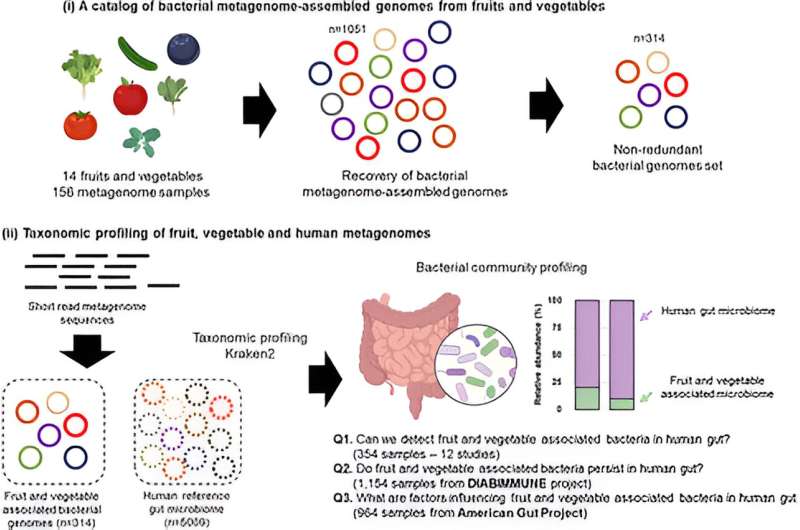This article has been reviewed according to Science X's editorial process and policies. Editors have highlighted the following attributes while ensuring the content's credibility:
fact-checked
trusted source
proofread
Study shows the microbiome of fruit and vegetables positively influences diversity in the gut

Bacterial diversity in the gut plays an important role in human health. The crucial question, however, is where are the sources of this diversity?
It is known that an important part of the maternal microbiome is transferred to the baby at birth, and the same happens during the breastfeeding period via breast milk. Further sources were yet to be discovered.
However, a team led by Wisnu Adi Wicaksono and Gabriele Berg from the Institute of Environmental Biotechnology at Graz University of Technology (TU Graz) has now succeeded in proving that plant microorganisms from fruit and vegetables contribute to the human microbiome. They report this in a study published in the journal Gut Microbes.
You are what you eat
The authors were able to demonstrate that the frequency of fruit and vegetable consumption and the variety of plants consumed influences the amount of fruit- and vegetable-associated bacteria in the human gut. Early childhood in particular represents a window of opportunity for colonization with plant-associated bacteria. It was also demonstrated that the microorganisms of plant origin have probiotic and health-promoting properties.
A microbiome is the totality of all microorganisms that colonize a macroorganism (human, animal, plant) or a part of it, for example the intestine or a fruit. While the individual microbiomes are becoming better understood, little is known about their connections.
"The proof that microorganisms from fruits and vegetables can colonize the human gut has now been established for the first time," explains first author Wisnu Adi Wicaksono.
This suggests that the consumption of fruit and vegetables, especially in infancy, has a positive influence on the development of the immune system in the first three or so years of life, as the intestinal microbiome develops during this time. But even after that, a good diversity of gut bacteria is beneficial for health and resilience. "It simply influences everything. Diversity influences the resilience of the whole organism; higher diversity conveys more resilience," says Institute head Gabriele Berg.
Several billion sequences
In order to be able to determine that the consumption of fruits and vegetables and their microbiomes actually leads to changes in the intestinal microbiome, the team first created a catalogue of microbiome data from fruits and vegetables which enabled them to assign their bacteria. They compared these with publicly available data from two studies on intestinal flora.
The TEDDY project looked at the development of babies in a long-term study and the American Gut Project studied the intestinal microbiome of adults—both projects also collected data on the food intake of the test persons. In total, the researchers had metagenome data from around 2,500 stool samples at their disposal, each of which contained between one and 10 million sequences—several billion sequences were thus evaluated.
Using this extensive data set, the presence of fruit and vegetable microflora in the gut could be demonstrated. This evidence is a crucial building block in proving the WHO's One Health concept, which closely links human, animal and environmental health.
Follow-up study on three continents
To further explore this connection, together with international colleagues and within the HEDIMED project Gabriele Berg at the Institute of Environmental Biotechnology is already working on an intervention study in which people on three continents eat exactly the same things for a certain period of time, following which their excretions are analyzed. But even beyond that, Gabriele Berg sees many areas that could be influenced on the basis of the study's findings. This starts with food production, as soil, fertilizer and pesticides affect the plant microbiome.
"Fresh fruit and vegetables will always have the best microbiome; agriculture or processing companies already have a major influence here. And the storage and processing of food must also be critically reconsidered," explains Berg. Depending on the findings of the planned study, there could also be exciting applications for individuals. "Every fruit and vegetable has a unique microbiome. So maybe at some point a personalized diet can be put together based on that."
More information: Wisnu Adi Wicaksono et al, The edible plant microbiome: evidence for the occurrence of fruit and vegetable bacteria in the human gut, Gut Microbes (2023). DOI: 10.1080/19490976.2023.2258565





















